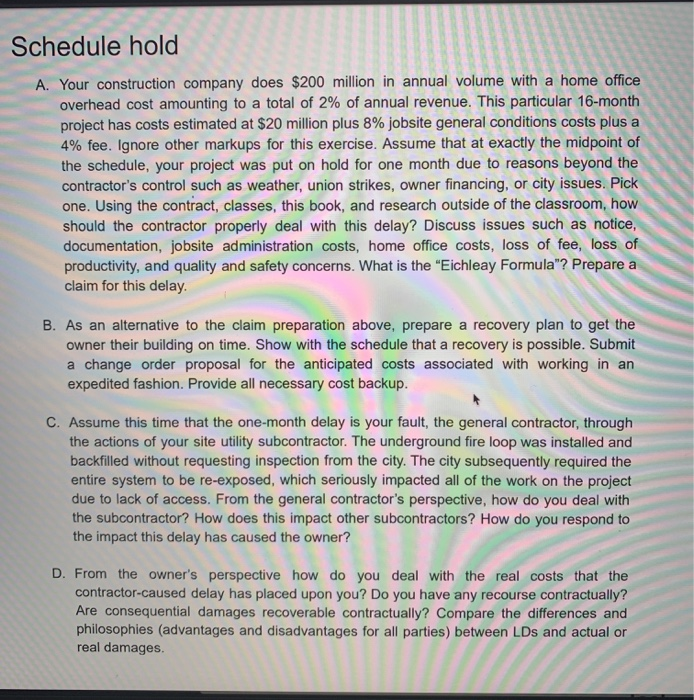Schedule hold A. Your construction company does $200 million in annual volume with a home office overhead cost amounting to a total of 2% of annual revenue. This particular 16-month project has costs estimated at $20 million plus 8% jobsite general conditions costs plus a 4% fee. Ignore other markups for this exercise. Assume that at exactly the midpoint of the schedule, your project was put on hold for one month due to reasons beyond the contractor's control such as weather, union strikes, owner financing, or city issues. Pick one. Using the contract, classes, this book, and research outside of the classroom, how should the contractor properly deal with this delay? Discuss issues such as notice, documentation, jobsite administration costs, home office costs, loss of fee, loss of productivity, and quality and safety concerns. What is the "Eichleay Formula"? Prepare a claim for this delay. B. As an alternative to the claim preparation above, prepare a recovery plan to get the owner their building on time. Show with the schedule that a recovery is possible. Submit a change order proposal for the anticipated costs associated with working in an expedited fashion. Provide all necessary cost backup. C. Assume this time that the one-month delay is your fault, the general contractor, through the actions of your site utility subcontractor. The underground fire loop was installed and backfilled without requesting inspection from the city. The city subsequently required the entire system to be re-exposed, which seriously impacted all of the work on the project due to lack of access. From the general contractor's perspective, how do you deal with the subcontractor? How does this impact other subcontractors? How do you respond to the impact this delay has caused the owner? D. From the owner's perspective how do you deal with the real costs that the contractor-caused delay has placed upon you? Do you have any recourse contractually? Are consequential damages recoverable contractually? Compare the differences and philosophies (advantages and disadvantages for all parties) between LDs and actual or real damages Schedule hold A. Your construction company does $200 million in annual volume with a home office overhead cost amounting to a total of 2% of annual revenue. This particular 16-month project has costs estimated at $20 million plus 8% jobsite general conditions costs plus a 4% fee. Ignore other markups for this exercise. Assume that at exactly the midpoint of the schedule, your project was put on hold for one month due to reasons beyond the contractor's control such as weather, union strikes, owner financing, or city issues. Pick one. Using the contract, classes, this book, and research outside of the classroom, how should the contractor properly deal with this delay? Discuss issues such as notice, documentation, jobsite administration costs, home office costs, loss of fee, loss of productivity, and quality and safety concerns. What is the "Eichleay Formula"? Prepare a claim for this delay. B. As an alternative to the claim preparation above, prepare a recovery plan to get the owner their building on time. Show with the schedule that a recovery is possible. Submit a change order proposal for the anticipated costs associated with working in an expedited fashion. Provide all necessary cost backup. C. Assume this time that the one-month delay is your fault, the general contractor, through the actions of your site utility subcontractor. The underground fire loop was installed and backfilled without requesting inspection from the city. The city subsequently required the entire system to be re-exposed, which seriously impacted all of the work on the project due to lack of access. From the general contractor's perspective, how do you deal with the subcontractor? How does this impact other subcontractors? How do you respond to the impact this delay has caused the owner? D. From the owner's perspective how do you deal with the real costs that the contractor-caused delay has placed upon you? Do you have any recourse contractually? Are consequential damages recoverable contractually? Compare the differences and philosophies (advantages and disadvantages for all parties) between LDs and actual or real damages







